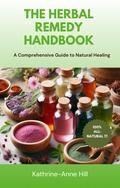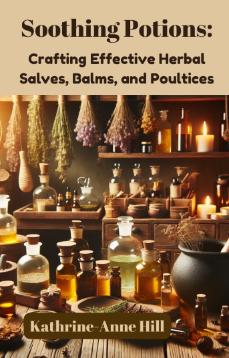Herbal Remedies for Digestive Health: Soothing Stomach Ailments Naturally
Discover effective herbal remedies for digestive health at NaturalBeauty Tales. Learn how to soothe stomach issues naturally with herbs like peppermint, ginger, and fennel. Explore easy-to-make teas and tinctures for a happier, healthier gut.
HERBAL WISDOM
Kathrine-Anne Hill
8/28/20249 min read


Affiliate Disclaimer:
Please note that some of the links in this article are affiliate links. This means that if you click on these links and make a purchase, I may receive a small commission at no additional cost to you. This commission helps support the maintenance and growth of this website and allows me to continue providing valuable information and recommendations. Rest assured, I only recommend products and services that I have personally used or thoroughly researched. Your support is greatly appreciated! “As an Amazon Associate I earn from qualifying purchases.”
Introduction to Herbal Remedies for Digestive Health
Maintaining digestive health is essential for overall well-being, as the digestive system plays a critical role in nutrient absorption and waste elimination. However, many individuals experience common digestive issues such as bloating, indigestion, and stomach cramps. In response to these ailments, there has been a growing interest in herbal remedies as a natural and holistic approach to support and soothe the digestive system.
Herbal remedies have been utilized for centuries in various cultures to combat digestive discomfort. Among the most commonly used herbs are peppermint, ginger, and fennel. These herbs are celebrated for their therapeutic properties and efficacy in easing a range of digestive issues.
Peppermint, known for its cooling and calming effects, is often used to alleviate symptoms of irritable bowel syndrome (IBS) and to relieve gas and bloating. Ginger, with its potent anti-inflammatory and pro-digestive qualities, is effective in reducing nausea and supporting overall digestive function. Fennel, rich in essential oils and fibers, is recognized for its ability to relax the gastrointestinal tract and mitigate symptoms such as gas and cramps.
The advantage of using herbal remedies lies in their ability to offer gentle, yet effective, relief without the side effects commonly associated with pharmaceutical treatments. Additionally, these herbs can often be integrated into one's diet or consumed in various forms such as teas, tinctures, or supplements, making them accessible and easy to administer.
Understanding and harnessing the power of these natural remedies can empower individuals to take control of their digestive health. By incorporating herbs such as peppermint, ginger, and fennel into daily routines, one can experience significant improvements in digestive comfort and functionality.
The Healing Properties of Peppermint
Peppermint has long been valued for its potent healing properties, particularly for digestive health. This aromatic herb, rich in menthol, has a unique ability to relax the smooth muscles of the gastrointestinal tract. By alleviating muscle tension, peppermint can significantly reduce pain and discomfort commonly associated with conditions like irritable bowel syndrome (IBS) and dyspepsia.
One of the primary benefits of peppermint is its efficacy in reducing bloating. Bloating, often caused by trapped gas or indigestion, can be eased by the antispasmodic properties of peppermint. This effect not only reduces physical discomfort but also enhances overall digestive function. Individuals experiencing frequent bloating may find substantial relief simply by incorporating peppermint into their daily regimen, whether through tea, capsules, or essential oils.
Peppermint also aids in improving bile flow, thus facilitating better digestion and absorption of nutrients. Enhanced bile flow is particularly beneficial for individuals with sluggish digestive systems or those prone to gallbladder issues. By promoting bile production and release, peppermint ensures that fats are efficiently broken down and assimilated, mitigating digestive disturbances that can stem from poor bile function.
While peppermint's benefits for digestive health are considerable, it is important to approach its use with caution, particularly for those with specific health conditions. For instance, individuals with gastroesophageal reflux disease (GERD) might experience exacerbated symptoms when using peppermint, as it can relax the lower esophageal sphincter, allowing acid to flow back into the esophagus. Additionally, peppermint should be used judiciously in young children and pregnant women, as its potent effects may not always be appropriate for these sensitive groups.
In essence, peppermint stands out as a natural and effective remedy for a variety of digestive ailments. By understanding both its benefits and potential side effects, individuals can make informed choices about integrating this herbal remedy into their health routines.
Ginger: A Time-Honored Digestive Aid
Ginger has long been celebrated for its medicinal properties, particularly in the realm of digestive health. This robust rhizome is widely recognized for its potent anti-inflammatory and anti-nausea capabilities. Its therapeutic benefits in treating various digestive ailments, such as motion sickness, nausea, and indigestion, make it a valuable natural remedy.
One of the key compounds in ginger, gingerol, plays a significant role in its health-promoting properties. Gingerol is responsible for the spice's distinct flavor and its anti-inflammatory effects, which can help soothe an irritated digestive system. Additionally, ginger has been shown to enhance the emptying of the stomach, facilitating smoother digestion and reducing symptoms of bloating and discomfort.
Ginger's efficacy in combating nausea is particularly noteworthy. For individuals suffering from motion sickness, consuming ginger prior to travel can greatly alleviate symptoms. Similarly, it is often recommended for pregnant women dealing with morning sickness, as it provides a natural alternative to pharmaceutical interventions. By stimulating digestive enzymes, ginger enhances the breakdown and absorption of nutrients, thereby improving overall digestive efficiency.
There are several ways to incorporate ginger into one's diet to harness its digestive benefits. Fresh ginger root can be grated or sliced and added to teas, smoothies, and savory dishes. For those who prefer a more convenient option, powdered ginger supplements are readily available and offer a concentrated dose of gingerol and other active compounds. Ginger candies and lozenges are also popular, particularly for on-the-go relief from nausea and indigestion.
As a time-honored remedy, ginger continues to be a trusted ally for promoting digestive health. Whether consumed fresh or as a supplement, its multifaceted benefits and ease of use make it an indispensable component of natural health practices aimed at soothing stomach ailments.
Fennel: An Underrated Digestive Booster
Fennel, a perennial herb with a licorice-like flavor, has long been heralded for its multifaceted benefits in aiding digestive health. The seeds and extracts of fennel are particularly celebrated for their carminative properties, which help alleviate common digestive issues such as gas, bloating, and cramping. These attributes make fennel an excellent natural remedy for those seeking relief from gastrointestinal discomfort.
One of the primary active compounds in fennel is anethole, which is known to relax the smooth muscles in the gastrointestinal tract. This relaxation facilitates the passage of gas and eases cramps, thereby providing noticeable relief to individuals experiencing abdominal discomfort. Additionally, fennel's anti-inflammatory properties further contribute to soothing the digestive lining, making it particularly beneficial for those with irritable bowel syndrome (IBS) or other inflammatory digestive conditions.
Incorporating fennel into the diet can be done in various ways. Fresh fennel can be added to salads or cooked dishes for a burst of flavor and digestive support. Fennel seeds, often consumed after meals, can be chewed directly or brewed into a tea. To prepare fennel tea, simply steep crushed fennel seeds in boiling water for about 10 minutes. The resulting infusion not only aids digestion but also freshens breath.
When it comes to fennel extracts, these are available in various forms, such as essential oils and capsules. While these extracts can offer concentrated digestive benefits, it is crucial to use them with caution. High doses of fennel extract may lead to adverse effects, such as photosensitivity or allergic reactions. Therefore, it is advisable to consult with a healthcare provider before incorporating fennel extracts into one's routine, especially for those who are pregnant, breastfeeding, or have pre-existing medical conditions.
Overall, fennel stands out as a versatile and effective herbal remedy for promoting digestive health. Its ability to reduce gas, bloating, and cramping makes it a valuable addition to any natural wellness regimen.
DIY Recipes: Teas, Tinctures, and Syrups for Digestion
Creating your own herbal teas, tinctures, and syrups at home offers a convenient and natural approach to supporting digestive health. By preparing remedies with ingredients such as peppermint, ginger, and fennel, you can tailor the potency and dosage to meet your specific needs. Below, you will find detailed recipes for these beneficial digestive aids.
Peppermint Tea
Ingredients:
1 tablespoon dried peppermint leaves
8 ounces boiling water
Instructions:
Place the dried peppermint leaves in a tea infuser. Pour boiling water over the leaves and let steep for 5-10 minutes. Remove the infuser and enjoy warm. Peppermint tea can be consumed up to three times daily to alleviate digestive discomfort.
Ginger Tincture
Ingredients:
1/2 cup fresh ginger root, finely chopped
1 cup vodka or brandy
Instructions:
Fill a glass jar with the chopped ginger root and cover it with vodka or brandy, ensuring the ginger is fully submerged. Seal the jar tightly and store in a cool, dark place, shaking it daily. After 4-6 weeks, strain the mixture through a cheesecloth and transfer the liquid to a clean bottle. The standard dosage is 1-2 teaspoons diluted in water, taken before meals to promote digestion.
Fennel Syrup
Ingredients:
1 cup fennel seeds
2 cups water
1 cup honey
Instructions:
Combine the fennel seeds and water in a saucepan and bring to a boil. Reduce heat and simmer for 20 minutes. Strain the liquid to remove the seeds, then return it to the saucepan and add honey. Stir until the honey is fully dissolved. Pour the mixture into a bottle and store in the refrigerator. Take 1 tablespoon of the syrup after meals to help alleviate digestive issues.
By making these herbal remedies at home, you can ensure the use of high-quality ingredients and control the consistency and strength of each concoction. This personalized approach not only supports digestive health but also embraces the tradition of natural medicine.
Integrating Herbal Remedies into Your Digestive Health Routine
Incorporating herbal remedies into your daily regimen for digestive health can offer numerous benefits, helping to soothe stomach ailments and maintain a balanced digestive system. It is crucial to adopt a consistent approach to experience the full advantage of these natural treatments.
Begin by selecting one or two herbs that address your specific digestive concerns. For instance, if you suffer from bloating or indigestion, consider incorporating ginger and peppermint into your routine. These herbs can be consumed in various forms, such as teas, tinctures, or capsules, which allows for flexibility in how you integrate them into your daily life.
Consistency is key when using herbal remedies. Establish a routine that includes taking your chosen herbs at the same time each day, whether it is before meals, after meals, or at bedtime. This helps your body to become accustomed to the benefits of the herbs and improves their efficacy. Combining different herbs can also enhance their effects. For example, pairing fennel with chamomile can provide a soothing and calming digestive aid, while combining licorice root with dandelion may support liver health and digestion synergy.
Monitoring the effectiveness of these remedies is essential. Keep track of any changes in your digestive health, noting improvements or any potential side effects. Maintaining a journal can be an effective way to record your observations and adjust your routine as needed. If you experience any adverse reactions or if symptoms persist, it is advisable to discontinue use and seek guidance from a healthcare professional.
Consulting with a healthcare provider before starting any herbal regimen is recommended, particularly if you are taking other medications or have pre-existing health conditions. This ensures the safe and appropriate use of herbal remedies in your quest for optimal digestive health.
By thoughtfully integrating herbal remedies into your daily routine, you can harness their natural healing properties to support and maintain a healthy digestive system, paving the way for overall well-being.
Related Posts:
Natural Detox with Herbal Tonics: Cleansing and Rebalancing Your Body
Creating Your Own Herbal First-Aid Kit: Simple Recipes for Common Ailments
Herbal Remedy eBooks












The Herbal Remedy Handbook: A Comprehensive Guide to Natural Healing
Discover how to create your own herbal garden, both indoors and out, and learn effective natural remedies for immune support, digestive health, and skin conditions. Available on Google Play for $7,99


Soothing Potions: Crafting Effective Herbal Salves, Balms, and Poultices
Discover the world of herbalism and natural healing in this comprehensive guide. Exploring the basics of herbalism, you'll learn about the incredible benefits of using herbal remedies for various ailments. The book delves into the art of crafting herbal salves, healing balms, poultices and medicinal teas, providing step-by-step instructions and valuable insights. Available on Google Play for $6.99
Affiliate Disclaimer:
Please note that some of the links in this article are affiliate links. This means that if you click on these links and make a purchase, I may receive a small commission at no additional cost to you. This commission helps support the maintenance and growth of this website and allows me to continue providing valuable information and recommendations. Rest assured, I only recommend products and services that I have personally used or thoroughly researched. Your support is greatly appreciated!

